Wed 31 Mar 2021
A Book! Movie!! Review by Dan Stumpf: DOROTHY B. HUGHES – Ride the Pink Horse //Film (1947).
Posted by Steve under Crime Films , Reviews[6] Comments
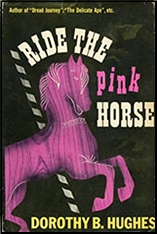
DOROTHY B. HUGHES – Ride the Pink Horse. Duell, Sloan & Pearce, hardcover, 1946. Dell #210, mapback edition, date? [1948. See comments.] Reprinted many times since.
RIDE THE PINK HORSE. Universal, 1947. Robert Montgomery, Wanda Hendrix, Andrea King, Thomas Gomez, Fred Clark, Art Smith, Martin Garralaga and John Doucette. Screenplay by Ben Hecht and Charles Lederer, based on the novel by Dorothy B. Hughes. Directed by Robert Montgomery. Available on DVD but not found on any streaming platform at the present time.
I wish I’d read the book first. Having seen the movie and its made-for-TV remake (The Hanged Man, 1964, directed by Don Siegel), I wasn’t fully attuned to what Dorothy B Hughes was doing until the last pages.
What she was doing was taking a tough gangster tale and turning it into a metaphysical hike into Hell. When the story opens, a tough Chicago hood called Sailor arrives in a small New Mexico town to collect a debt from a senator (called Sen) who doesn’t want to pay. Since the debt in question is Sailor’s fee for killing Sen’s wife, the matter has to be settled with some delicacy, but Sailor is tough, smart, and up to the job.
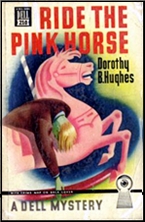
Or so he thinks. But he’s walking into a trap set for him not by Sen, but by a cruel universe. The small town is the scene of a local festival that has filled every hotel and spare bed in town, so Sailor has to hustle just for the necessities. The mix of frolic, need, superstition, duplicity, and spirituality that mark the pageant have an odd effect on his psyche, awakening old memories and vague fears, hemming him in with uncaring crowds who speak a foreign language — but it’s Sailor who is the real foreigner in an alien landscape.
Hughes fills the story with memorable characters: a thoughtful cop, the weaselly senator, a mysterious girl, an earthy laborer, bartenders, clerks, and a lovely innocent, seen only at a distance until a final corrosive moment when—. But I’m telling too much.
Suffice it to say that Hughes evokes a struggle for Sailor’s soul, with self-appointed guardian angels rolling the dice against the darker forces (the name Sen seems meaningful here) that keep pulling him into nightmare. She also keeps us firmly caged in Sailor’s perceptions, as she did with the killer of In a Lonely Place, making this is a tale to compare with the most harrowing pulp nightmares of Jim Thompson and David Goodis.
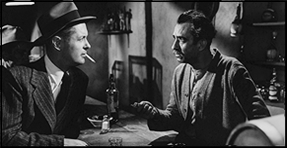
Robert Montgomery softened the story out of necessity — the murdered wife ploy becomes a bit of extortion attempted by a rubbed-out friend of Sailor’s (here named Lucky Gagin) and the Senator is now a war profiteer, superbly limned by Fred Clark, one of the finest and most unsung character actors of his time.
Likewise, Thomas Gomez does quite well as the sweaty and philosophical Mexican carousel impresario, Art Smith makes a surprisingly gentle G-Man, Wanda Hendrix combines a mysterious mien with a touching teenage crush, and Andrea King provides chills as one of the coldest femmes fatales in all of noir.
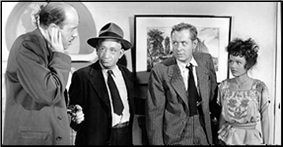
Robert Montgomery directs smoothly and unobtrusively, as if apologizing for his work on Lady in the Lake (1946). Looking back on it, Lake was a mistake that someone had to make sooner or later, but that’s a discussion for another day. The only problem with Montgomery in Ride the Pink Horse is that he lacks the type-cast toughness that Bogart, Cagney, or Dick Powell could have brought to the role. He’s obviously acting here, acting very well, but still not living the part.
I saw the TV remake sometime in my callow youth, and I wish I could have watched it again for this piece, but it seems to have sunk into the oblivion that swallowed all too many films of its ilk. Too bad, for I remember it fondly.
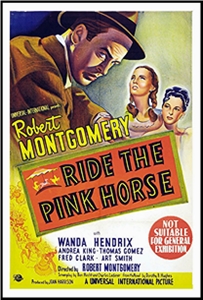
March 31st, 2021 at 8:07 pm
The television movie has a strong cast too, Robert Culp, Edmond O’Brien, Gene Raymond, and Vera Miles. It deserves to be rescued. I have a decent copy off of YouTube, but it is scratchy.
Hughes in this and books like IN A LONELY PLACE comes close to going well past the hard-boiled noir sensibility into Graham Greene country. There is a depth here that goes well beyond the crime story and a sense of a novelist eye brought to the genre.
I’m not suggesting that is superior to genre fiction, only that it allows for the creation of more serious themes and ideas like Sailor’s descent into a literal underworld here echoing classical themes with casual ease.
March 31st, 2021 at 9:24 pm
Martin Garralaga –if I’m not mistaken –was an actor of Spanish heritage with over 200 film appearances. Boasting of a surprising variety of roles thanks to his swarthy complexion. You’ll be surprised if you examine his bio. In fact I believe he (like so many emigres) appeared in ‘Casablanca’. A busboy, or a waiter, or suchlike.
Serials as well –I’m not in any state at the moment I’m penning this comment, to pinpoint exactly who’s serial sidekick he portrayed, but it was something like Cisco Kid or Zorro or something like that. Something southwestern.
I enjoyed the Montgomery film (Wanda Hendrix signature role, poignant she was in it, too) …without making more of it than it was … but I can see now, (thanks to the above review) that I have missed out not having read the novel.
However I must admit I am a bitter enemy of the Nicholas Ray film. I’d literally rather be punched in the face.
March 31st, 2021 at 9:40 pm
You are right. Martin Garralaga was a headwaiter in CASABLANCA. He had the kind of face that once seen would never be forgotten. And as Cisco Kid’s sidekick Pancho, doubly so.
But as for IN A LONELY PLACE, we will have to agree to disagree. It’s one of my favorite movies.
April 1st, 2021 at 3:33 am
Yes, this is one of my favourite film noir. I remember the opening sequence of of the Greyhound bus arriving in a small town (as single-shot?) Lasting over five minutes. Then I discovered it was Russell Metty who did this, and who shot the opening sequence for “A touch of evilâ€. Great script writers too.
April 4th, 2021 at 10:27 am
According to Robert Reginald’s Cumulative Paperback Index, 1939-1959, Borgo Press, 209, the publication date for the Dell Mapback edition was 1948.
April 4th, 2021 at 10:45 am
Thanks, Bill. I’d been meaning to research the date a little more myself, but good intentions and all that. I bought a copy of Reginald’s CPI as soon as I saw a copy in my local library, and I used it as a guide for collecting as many of the mystery paperbacks listed in it as I could. It helped make me who I am today, that’s for sure!